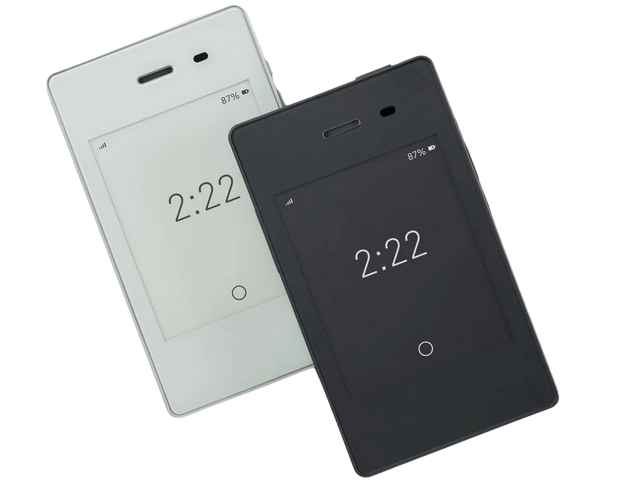This post was last updated on March 30th, 2025 at 09:46 am
To my readers who feel they’re ready to switch to a flip phone (aka “dumb” phone), I salute you. You’ve made a bold decision, one that comes with long-term rewards. Just be warned: Many flip phones aren’t made like they used to be. Product selection and quality have suffered in recent years.
Too many flip phones on the market today seem like they were designed by companies who think the only reason people buy flip phones is because 1) smartphone technology intimidates them or 2) they can’t afford a smartphone. These phones try to replicate the smartphone experience by featuring apps ill-suited for the flip-phone design. The final insult is their slow, glitchy operating systems.
But fear not: There’s an emerging market for people like you and me. A wider, better selection of dumbphones is coming. In this post, I highlight five companies (Light Phone, Techless, Mudita, Punkt, and Sunbeam) that have designed devices for people who want less, not more.
My disappointing experience
I didn’t realize how far the dumbphone had slipped in quality until 2019 when I needed to replace a little LG flip phone that I had been using for nearly seven years. I didn’t want to part with it, but I had no choice because it ran on a 3G network, and my carrier at the time, Verizon, announced it would be shuttering its 3G network.
Without giving the matter much consideration, I bought an Alcatel flip phone. This phone had more features than my little LG, but they didn’t add to the user experience. On the contrary, its operating system took too long to transition between different functions and often would get “hung up,” requiring me to restart the phone. I then did some research and encountered online other people who expressed similar disappointments with new dumbphones. We collectively longed for the days when flip phones were more dependable.
Entrepreneurs offer hope with new minimalist phones
Fortunately, my research led me to information about a select group of companies that recognize smartphones have become a problem. A lot of people want to simplify their lives. They’re looking for a no-nonsense, functional phone like the ones made before the smartphone’s arrival.
A company called Light Phone was perhaps the first to recognize this emerging demand for devices that delivered less. The New York-based company released a phone in 2017 after raising funds through a Kickstarter campaign. In 2018, it released the Light Phone II, an improvement on the original. With its candy-bar form factor, this phone performs basic functions, namely texting and talking. It also offers an alarm clock, podcast, music, calendar, and navigation tools. It also incorporates an e-ink interface, giving the phone a calming appearance.

Read my interview with Light Phone co-founder Kaiwei Tang
Some Light Phone II fans wanted a camera, and the company added one with the unveiling of the Light Phone III. The first set of orders were released in March 2025. This phone has other enhancements as well, including 5G capability. It also includes a microchip that could allow it to someday support a digital wallet and video calls. Interestingly, it comes with a “clickable wheel” that can be used to easily adjust screen brightness.
Whether a minimalist phone should include a camera or video capability is a matter of opinion. I personally think people take way too many photos, largely as a result of their overuse of social media. But I also realize that a camera can have practical purposes, such as when trying to show a hardware store employee what type of part you need for that plumbing project you’re trying to finish. (Yes, I’m speaking from personal experience.)
The one thing these new companies agree on is a complete ban on internet browsing and social media apps.
Other start-ups besides Light Phone
European companies: Mudita and Punkt
I’m eager to see how the minimalism phone market evolves over the next few years. Europe is home to two minimalist phone manufacturers, Switzerland-based Punkt and Poland-based Mudita. Mudita’s Pure phone had been slated for an October 2020 release, though a series of delays pushed back shipping until 2022. As of August 2022, the company finished its crowdfunding campaign. The company’s slogan is, “Enjoy life. Offline,” similar in spirit to the Light Phone tagline, “A phone for humans.” Like the Light Phone, the Mudita Pure has a candy-bar design and e-ink screen.
Techless
If you’re looking to buy from a U.S.-based company, another option is the Wisephone from Techless. It’s a Samsung device with a minimalist-styled interface, though it’s not e-ink. Unlike the Light Phone, the Wisephone is sold with a subscription (three different tiers of service are available starting at $25 a month). As of the summer of 2024, Techless was preparing to roll out the Wisephone II, the device’s second generation.
Families appear to be Techless’ target market. One selling point is that a Wisephone looks like a smartphone and, presumably, doesn’t carry the same social stigma as a flip phone (I’m familiar with the occasional odd looks from people who see me whip out a flip phone). Presumably, teens won’t feel embarrassed (or as embarrassed) using a Wisephone, while parents won’t have to worry about their kids exploring the dark recesses of the internet.
Read my interview with Techless founder Chris Kaspar
Sunbeam
Last but certainly not least, I’ll mention Sunbeam, which I discovered from a comment on this post. I appreciate the classic flip-phone appearance and admire the functionality, including a voice-to-text feature, accessible with a $3.50 per month subscription. The subscription also allows navigation and weather, depending on the device. Like the Wisephone and Light Phone, the Sunbeam device includes quality support. The Sunbeam is also entering its second generation of devices with the recent release of the F1 Horizon and the F1 Pro (a rugged phone).
Where to find phone reviews
If you’re not sure which “dumb” phone to buy, you might check out Jose Briones’ You Tube channel. He tries out different phones and then provides a detailed review. Briones pays close attention to phone functionality and how well manufacturers support their devices. The level of support can separate a great phone from a mediocre one, Briones told Frugalmatic during a recent interview.
So far, he’s reviewed more than 20 different devices, including the Light Phone, Wisephone, and Sunbeam.
Wondering which one of these phone I picked? Read my review here
Peering into the dumbphone’s future
Despite the flip phone’s decline, I’m actually feeling optimistic. As more of us tire of all the distractions generated by smartphones, I’m convinced the market for alternatives will grow. Techless, Sunbeam, Light Phone, Punkt, and Mudita seem early in the quest to develop stylish and dependable devices providing “freedom” from distractions. I predict many more companies will join them, as more people recognize the health benefits of dumping their smartphones. Smartphones, years from now, may become known as the cigarette of the 21st century.
I also hope we stop calling minimalist devices dumbphones (how about “freedom” phones?). Because what’s dumber—living a life of constant distraction or being free from it? Please share if you believe the answer is the latter.


I want to mention gabbwireless as another excellent alternative to smartphones, especially for parents who want to be able to stay in contact with their children, but also don’t want them to have online access.
Thanks for mentioning this phone. I did look it up, and it’s great to see more options out there.
Just buy a kosher phone😊
I appreciate the pioneers here, but so far the options miss the mark. Just in case a tech entrepreneur is reading this, here is the feature set that I wish for:
• No internet browsing, period.
• No social media apps, period.
• Keep other smartphone features such as a backlit screen, media storage, camera, flashlight, GPS, etc. These are useful tools, not distractions. (The problem is internet addiction and doom-scrolling, not these things.)
• It still needs a usable keyboard. Texting on a flip phone is just not good.
• A reasonable cost. Even though less is more, it is not reasonable to pay more for less.
Well, a big reason that these tech less phones are more than some smart phones is because the smart phones make money off of you, and take a loss for the actual product… because they can afford to. It is worth it to them. But it may be asking too much of these other companies who don’t collect or sell your data to try to take a loss on the product, too. What you get with these companies is honest privacy, no tracking from google, etc. You are off the grid!
That’s a really good point, Madison. These are smaller companies, and so they can’t mass-produce phones and take advantage of “economy of scale” in the same way that Apple and other big companies can.
I recently went through a long, painful search for a new “dumb phone” as my old 3G one broke. I’ve never had a smartphone and buying one was out of the question – the thought of having the internet in my pocket at all times fills me with horror. I’m not a senior citizen, I’m in my 30s. I just don’t want to slide into phone addiction.
I could not find anything I wanted for the first couple of evenings of research. The Wisephone was definitely not it – at $400, priced like a smartphone and still looks like a smartphone, which would lead people to assume I can go online. Occasionally I’m self-conscious when I pull out my phone (though rarely in my home state of Vermont, where a surprising number of people still have basic phones), but I also like that people know at a glance that I won’t be able to do the same things someone with a smartphone can do.
The Light Phone wasn’t it either: TOO minimalist and still super expensive. I wanted a phone with all the features of my trusty old flip phone – calling, texting, group messages, photos, calculator, calendar, etc. – but with no web browser or internet capabilities at all. That’s the big difference between a basic phone and a smartphone: the internet being in your pocket. Adding a bunch of basic tools like calendar and flashlight does not make your phone more distracting. And being able to take and see photos easily, since people send them to you all the time, is very handy.
Finally I found what is apparently the one product in existence that checks all my boxes! The Sunbeam Orchid (sunbeamwireless.com). It’s a flip phone with a map app only, my dream. At $195 it’s not cheap but not ridiculous. I’ve only found one written review online, which surprises me. It’s not a perfect product, but the company has been extremely responsive to all my questions and is constantly working on updates. I hope they get more recognition.
Thanks for sharing, Sonia. This is the first I’ve heard of Sunbeam. I’m glad to hear you’ve found something that “checks all your boxes.” It’s no small feat to find a dumb phone that you really enjoy! I still haven’t decided on a new dumb phone yet, but I’ll keep your suggestion in mind.
Hey! I’m glad to see that there’s some discussion here and that my blog was mentioned (haha).
IMO the asking price is the barrier to entry. If it was more affordable, I’d be using it in my day to day life right now. Something I can keep on me in case of emergenices, if I’m out with friends (no distractions), etc.
At the asking price ($400 iirc), it’s more expensive than a brand new Pixel 4a. That’s why I’m so hesitant to recommend the swap. Why would anyone WANT to spend extra money for so much less?
The extra features, I suppose, would justify the cost a bit more, but serve as basic functions. A single LED flashlight wouldn’t need an app. A voice recorder to mp4 would store directly to the storage.
Music is my biggest gripe, as I LOVE my music. To see a phone without it would mean I’d need to a) buy (or pirate) all my music and load it into my phone or b) take my smartphone with me in order to play in the car.
I’d also love to see more affordable “dumb” phones that do the basics, but the light phone isn’t it for me. Thanks again for reading!
Lawrence,
You wrote a thoughtful piece, and I wanted others to be able to see your perspective. I certainly appreciate the price issue, and I expect that price to come down as more companies seek to offer their own minimalist phones. Eventually, I anticipate the “dumb” phone to become a status symbol of sorts (kind of like being debt free), though we’re probably several years from that point.
As a rebuttal to your point on price, I think the price is justifiable for some people who believe their smartphone use is harming their productivity. These people also recognize that they can’t really control their smartphone use, and so their solution is to give it up completely. Distractions have a cost, and the Light Phone could reduce costs for those who feel plagued by distraction.
That said, if I had to make an argument against the Light Phone, it would have to be yours. Nice job.